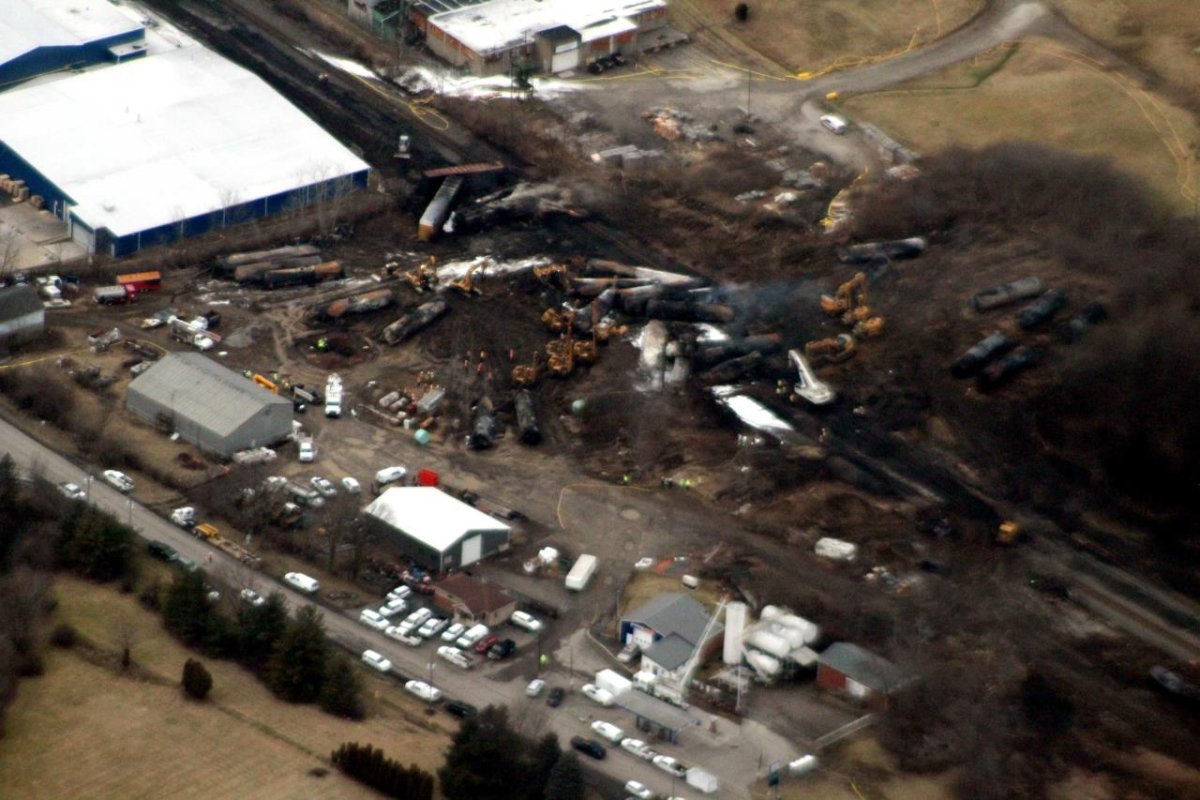Republican lawmakers have been accused of "the height of hypocrisy" by tabling a bill that would loosen regulations on industrial toxic waste disposal after many expressed their outrage at a toxic spill caused by a train derailment near East Palestine, Ohio, in February.
While the sprawling Lower Energy Costs Act, or HR1, would not undo any legislation that relates to the cause or response to the train derailment on February 3 near the border between Ohio and Pennsylvania, certain sections would potentially exempt businesses from environmental restrictions to enhance America's energy security, and would make companies with waivers exempt from litigation for hazardous pollution.
As such, if it were to become law, experts and environmentalists argue Republicans would be decrying a hazardous waste spill in one area while legislating to potentially allow for others to go unchecked. A House Energy and Commerce Committee aide told Newsweek that these "politics operatives' arguments are flimsy" and "hang on provisions that have been signed into law before or are existing authorities."
Republicans have said the bill would boost domestic energy output at a time when prices are high. HR1 would do so by implementing policies that would ease U.S. fossil fuel production, including eliminating certain restrictions on imports and exports of oil and gas, stopping the president from placing a moratorium on fracking, and opening up at least 4 new oil and gas leases a year in every state that has reserves.
They also noted that the bill "cuts red tape" on mining projects to increase mineral production, including those used in electric vehicles and wind turbines—two elements of Joe Biden's plans for a green economy. America largely relies on imports of such minerals at present, and prices have risen 900 percent since 2020.
When the bill passed the Republican-led House with a vote of 225 to 204 on March 30, it was supported by four Democrat congressmen. But experts believe it is unlikely to make it past the Senate, where there is a slim Democrat majority.

GOP Outrage over East Palestine
The derailment of 38 rail cars on a Norfolk Southern train - 11 of which were carrying hazardous materials - caused toxic chemicals to leech into the soil surrounding the derailment site, as well as in nearby waterways, raising fears over the drinking water supply. The crash also caused a large fire, which led emergency responders to execute a controlled burn, venting noxious gases into the atmosphere.
Since being allowed to return home, residents have complained of symptoms associated with exposure to toxic chemicals, despite monitoring by the Environmental Protection Agency (EPA) and Norfolk Southern contractors showing safe readings. The EPA has been accused of initially downplaying the disaster and prioritizing railway operations, claims it denies.
Many Republican figures have been critical of the federal government's response to the disaster. Former President Donald Trump said the reaction to the spill had been marked by "indifference and betrayal" during a visit to East Palestine in February. Ohio's Republican senator J. D. Vance, who also visited, decried the contamination of local waterways, and in a March 13 tweet told President Biden to "show some leadership and help these Americans clean up their community."
Democrats have also criticized Transportation Secretary Pete Buttigieg for a slow response to the spill.
On February 27, Transport and Infrastructure Committee chair Sam Graves, GOP representative for Missouri, launched a probe into the EPA's actions.
In a letter to EPA Administrator Michael Regan the same day, the committee wrote that "significant concerns remain regarding the Biden Administration's response to this event and whether appropriate actions have been taken by the federal agencies to protect the community and the environment."
Graves was one of the original cosponsors of HR1. The Energy and Commerce Committee, which recommended the bill, has also launched oversight action into the environmental response to the train derailment. On March 28, Republican Representative Bill Johnson, whose district includes East Palestine, said the hearing "isn't about scoring cheap political points."
Referencing the spill, Elise Stefanik, House Republican Conference chair, pledged on February 27 that House Republicans "will demand transparency" and "stand up for safety." Lauren Boebert, a GOP representative from Colorado, joined criticism of Biden's visit to Ukraine instead of East Palestine, on February 17 writing that "we should be taking care of our own people here at home." Both have cosponsored HR1.
A bipartisan bill that seeks to strengthen rail safety requirements was introduced by Ohio's senators in March, following calls for tougher regulations. But while efforts are being made on improving rail safety in the Senate, lawmakers in the House have been accused of voting for the opposite in terms of environmental protections.

"For Republicans, hypocrisy is kind of a brand at the moment," Alex Waddan, an associate professor in politics at the University of Leicester, U.K. said. "The criticisms of what happened itself in East Palestine were clearly opportunist, in a sense the counterargument would be we need much greater regulation of railroad companies and the safety regulations in terms of how they transport toxic wastes around, rather than a deregulatory agenda."
He suggested that the hypocrisy was centered on "how they jumped on that incident," as HR1 is "entirely consistent with the way the Republicans have pushed a deregulatory agenda over the last forty years."
"It's the height of hypocrisy to be stepping in and criticizing [the] EPA for not being aggressive enough in dealing with the East Palestine disaster... then to turn around and pass this kind of legislation that would just have sweeping gutting of basic protections for whole categories of industrial facilities on very vague grounds, with no demonstrated need for it," Erik Olson, a senior strategic director at the Natural Resources Defense Council, told Newsweek.
"I can just imagine a couple of years from now, if this were actually enacted, having a bunch of industrial disasters and serious contamination of communities occurring, and politicians scurrying over to those sites where the contamination occurred and railing against [the] EPA for not taking action—and they've just deregulated it," he added.
"It's incredibly hypocritical," Alice Madden, political director of Greenpeace U.S.A., said. She noted that the East Palestine crash was "particularly horrific," adding: "People are dealing with this and instead of looking for solutions, they take advantage of just some political bashing of the EPA."
Newsweek contacted the offices of Graves, Stefanik and Boebert via email for comment on Thursday. The Energy and Commerce aide stressed that regulations pertaining to the response to toxic spills such as the one in East Palestine were not constrained by HR1 "in any way."
Graves has previously said that the bill "will lower energy costs for American families" which remain "unbearably high" by "removing unnecessary regulatory barriers to critical energy projects and by increasing our energy independence, all while continuing to protect our environment."
The Bill
HR1 is an omnibus bill, incorporating several smaller bills that look to amend environmental regulations. One section would provide waivers for companies to temporarily overlook requirements under the Solid Waste Disposal Act.
While those waivers are designed to last for 90 days, they may be reissued for longer periods and would be available to whichever companies the EPA Administrator and Secretary of Energy deems a critical resource for national and energy security.
Under such waivers, any action by a recipient company, including any hazardous pollution, "will not be considered a violation of any other federal, state, or local environmental law or regulation."
In his minority report on the bill, Democratic Representative Frank Pallone, ranking member of the House Energy and Commerce Committee, argued this was "a gross infringement on the rights of states to enact and enforce their own laws" and "likely unconstitutional."
Madden described the measure as a "corporate giveaway," adding: "What is the purpose of a legal exemption? To eliminate transparency, to eliminate redress, to allow a corporation to not have any responsibility."
Olson, meanwhile, described it as "a sweeping piece of legislation" that would give polluting companies "a get out of jail free card."
Marc Glass, principal environmental consultant at Downstream Strategies, who has advised state and federal contamination projects, noted that the companies that would count as a critical resource would be left to a political appointee, "so I expect it to be sort of an overly-utilized exemption, codified into law."
An Energy and Commerce aide responded that the provisions "are modeled on similar authority Congress already enacted into law for the emergency production of electric power" under the Obama administration. They noted that "waivers must avoid or minimize any environmental impact or conflict" with existing laws, and the bill does not prohibit judicial review of such waivers.
Glass feared that without companies being liable for hazardous waste, it would create "an unfunded cost to the public to then abate those risks. For example, from spills and releases that do pose health risks, then where does that cost fall—onto the public? Who's going to clean that up?"
The committee official said that "in no instance would a solvent party be absolved of clean-up liability for pollution."
Pallone's report lists a series of hazardous industrial wastes for which waivers could be granted under the proposed legislation, including many toxic chemicals used in an array of manufacturing, as well as dioxin-bearing wastes, which are "persistent" pollutants that can cause lasting damage to both humans and the environment.
Facilities that dispose of hazardous waste—such as those receiving shipments from the Norfolk Southern spill—could also be exempted from regulations on safe disposal.
Olson described it as a "huge regulatory loophole," adding: "We're very worried that basically, this would be a carte blanche for major industries to ask for a carve-out for industrial protections that have really been in place for decades."
Madden, who grew up in Missouri, recalled one of her earliest memories of pollution was dioxins. She would canoe along "a beautiful river" that was polluted, becoming "a wasteland; it had to be evacuated, everything died, people became ill." Madden said: "So it is devastating when something like that happens."
What Counts as Critical?
House Republicans cited America's dependence on other nations, such as China, for critical resources which are "vulnerable to supply disruptions" while promoting the bill. Energy security has been a key concern since Russia's invasion of Ukraine sent global oil prices skyrocketing, and tensions between Washington and Beijing have fueled fears of a trade war.
The bill, they say, would allow the federal government to react to national and energy security crises by doing away with environmental provisions to increase domestic output. In a March 29 statement, the caucus said the legislation "is in the best national security, economic, and environmental interests of the United States."
But by leaving what counts as a critical energy resource to the Energy Secretary, nor providing parameters for what constitutes an energy security emergency, Olson argued the measures are "vague," allowing for potential overuse.
"The definition is like one sentence long and completely malleable, so we're very concerned," he said. "I can imagine a future administration with ill will could carve out gaping holes in protections against hazardous waste."
"I'd doubt that's necessary for economic or security purposes—and in the narrow cases that it might be, there should be very clearly-defined situations where it applies," Glass commented. "I'd imagine that that won't be the case, that it'll be very easy to get those [waivers] and they'll be utilized."
He added that there would have to be a clear justification as to "why it would be acceptable to expose the public and ecological receptors to increased levels of health risks from exposure to chemicals."
Glass suggested that the metric would be to save citizens from an imminent invasion, but argued that economic reasons were not a good enough justification. He noted that we see "legacies of similar types of exemptions" already, pointing to the ongoing efforts to deal with hazardous waste from the Manhattan Project, which arose from an "immediate need to succeed in the war effort."
An Energy and Commerce aide said: "There is no mandate on EPA to make a decision, EPA makes this decision with another federal department," which would have to report to Congress for "accountability" on its decisions.
Will It Pass?
While Republicans hold the House, Democrats have a slim majority in the Senate, which some believe will stop HR1 in its tracks. Waddan characterized it as "signaling" GOP intentions "rather than anything that's actually going to come into effect."
Madden agreed it was "a performative bill" that was "sending a message to the GOP's campaign contributors that they're willing to do the industry's bidding." While she called it a "wild goose chase," Madden noted the Democrats were currently negotiating the debt ceiling, so the bill posed a "real threat" in environmentalists' eyes.
This was because, Olson explained, Senate members can sometimes "peel off" pieces of legislation and attach them to bills that are a "must-have" for the other party to get them passed. The former general counsel for the Senate Environment and Public Works committee added: "We'd like to hope the Senate would stop crazy legislation like this, but honestly, you're never sure what's going to happen in the Senate."
Correction, 4/11/23, 10:18 a.m. ET: This article was updated to note that Erik Olson is from the Natural Resources Defense Council, not the National Resources Defense Council.
Uncommon Knowledge
Newsweek is committed to challenging conventional wisdom and finding connections in the search for common ground.
Newsweek is committed to challenging conventional wisdom and finding connections in the search for common ground.
About the writer
Aleks Phillips is a Newsweek U.S. News Reporter based in London. His focus is on U.S. politics and the environment. ... Read more
To read how Newsweek uses AI as a newsroom tool, Click here.





